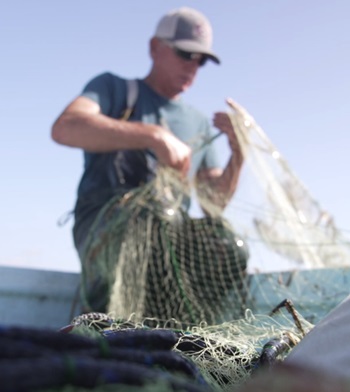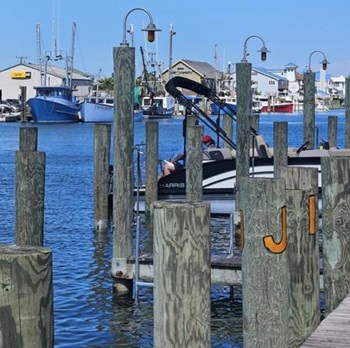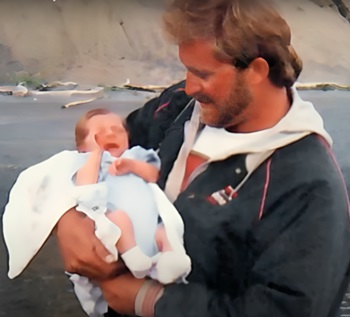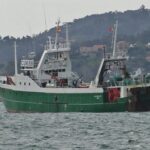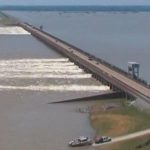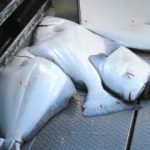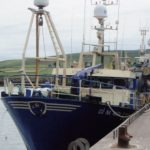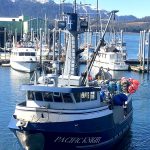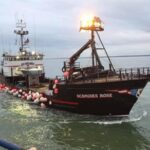 A divided federal appeals court on Wednesday stripped a regional fishery management council of its ability to block the U.S. Secretary of Commerce from taking actions to manage fisheries that the panel does not support, after finding the council’s members were unconstitutionally appointed. The Philadelphia-based 3rd U.S. Circuit Court of Appeals on 2-1 vote sided with two commercial fishermen who had sued after Mid-Atlantic Fishery Management Council amended a fishery-management plan to lower how much scup, summer flounder and black sea bass could be caught in their region. The fishermen, Raymond Lofstad and Gus Lovgren, challenged the constitutionality of the structure of the body, one of eight regional councils nationally tasked with developing fishery management plans, in their lawsuit. They are being represented by the libertarian Pacific Legal Foundation in their lawsuit. >>CLICK TO READ<< 11:05
A divided federal appeals court on Wednesday stripped a regional fishery management council of its ability to block the U.S. Secretary of Commerce from taking actions to manage fisheries that the panel does not support, after finding the council’s members were unconstitutionally appointed. The Philadelphia-based 3rd U.S. Circuit Court of Appeals on 2-1 vote sided with two commercial fishermen who had sued after Mid-Atlantic Fishery Management Council amended a fishery-management plan to lower how much scup, summer flounder and black sea bass could be caught in their region. The fishermen, Raymond Lofstad and Gus Lovgren, challenged the constitutionality of the structure of the body, one of eight regional councils nationally tasked with developing fishery management plans, in their lawsuit. They are being represented by the libertarian Pacific Legal Foundation in their lawsuit. >>CLICK TO READ<< 11:05
Tag Archives: commercial fishing
Is New Bedford the top commercial fishing port in the United States?
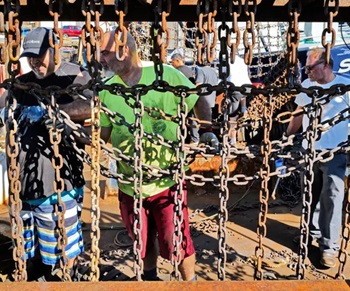 New Bedford takes great pride in its port, and its scallopers account for a significant portion of its value. It’s proven that the Port of New Bedford has great value. New Bedford still ranks as the top commercial fishing port by value as recently as 2022, according to figures released by the National Marine Fisheries Service, Oceanic and Atmospheric Administration, known as NOAA Fisheries. New Bedford had landed $443.2 million worth of seafood in 2022, again placing it at the top of NOAA Fisheries’ revenue list. That’s thanks in large part to all the scalloper landings in New Bedford contributing to the port’s value. Scallop landings accounted for 84 percent of the value. more, >>CLICK TO READ<< 06:22
New Bedford takes great pride in its port, and its scallopers account for a significant portion of its value. It’s proven that the Port of New Bedford has great value. New Bedford still ranks as the top commercial fishing port by value as recently as 2022, according to figures released by the National Marine Fisheries Service, Oceanic and Atmospheric Administration, known as NOAA Fisheries. New Bedford had landed $443.2 million worth of seafood in 2022, again placing it at the top of NOAA Fisheries’ revenue list. That’s thanks in large part to all the scalloper landings in New Bedford contributing to the port’s value. Scallop landings accounted for 84 percent of the value. more, >>CLICK TO READ<< 06:22
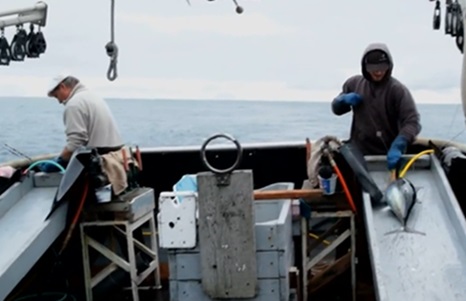
All hail the king of tuna, Oregon’s prized catch
One of Oregon’s most valuable seafoods is more popular than ever, but its nickname may fool you: chicken of the sea. It’s albacore tuna, and it is a fish that is grounded in Oregon commercial fishing history that reaches back nearly a century ago. Back then, West Coast fishermen went far out to sea in search of the albacore, also known as “chicken of the sea.” Albacore tuna entered Oregon fish markets in the 1930s when Oregon ports from Coos Bay to Astoria were home to large fishing fleets, dozens of canneries and thousands of employees who processed the catch. While Oregon’s large-scale canneries are long gone, albacore fishing techniques haven’t changed much at all, according to Steve Fick of Fishhawk Fisheries. Video, more, >>CLICK TO READ<< 09:55
A day in the life of 18-year-old fisherman Mat Price
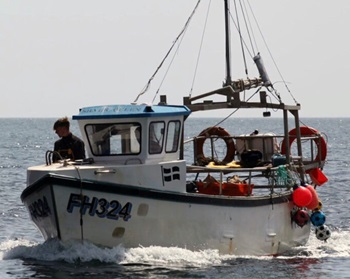 When it comes to a typical day’s crabbing, it’s the buzz of the alarm clock that quickens Mat’s pulse. “I wake up at around 6am, ready to get to John’s house for 6.30am. He lives about a minute and a half away from the boat, so I’ll jump in his van, and we’ll head down to the cove.” Cadgwith’s small New Holland tractor is in high demand by the beach-launched fleet. “The first job is to get the tractor – if it’s not already in use. We’ll then go to the cold room and load the rays and gurnards which we use for crab bait. Sometimes, if the boats are close together, we get the tractor right up to the side of the boat and can load all the bait and the other equipment up.” With everything loaded, it’s then a case of getting launched. “If someone at the cove hasn’t gone yet, they’ll push us out with the tractor. The tractor has a rubber roller on the front of it which is pushed up to the bow. The tractor then drives forward, pushing the vessel backwards out into the water until you’re floating. However, if nobody is there to push the boat out, then I’ll have to put my waders on…”Photos, more, >>CLICK TO READ<< 08:32
When it comes to a typical day’s crabbing, it’s the buzz of the alarm clock that quickens Mat’s pulse. “I wake up at around 6am, ready to get to John’s house for 6.30am. He lives about a minute and a half away from the boat, so I’ll jump in his van, and we’ll head down to the cove.” Cadgwith’s small New Holland tractor is in high demand by the beach-launched fleet. “The first job is to get the tractor – if it’s not already in use. We’ll then go to the cold room and load the rays and gurnards which we use for crab bait. Sometimes, if the boats are close together, we get the tractor right up to the side of the boat and can load all the bait and the other equipment up.” With everything loaded, it’s then a case of getting launched. “If someone at the cove hasn’t gone yet, they’ll push us out with the tractor. The tractor has a rubber roller on the front of it which is pushed up to the bow. The tractor then drives forward, pushing the vessel backwards out into the water until you’re floating. However, if nobody is there to push the boat out, then I’ll have to put my waders on…”Photos, more, >>CLICK TO READ<< 08:32
Darien shrimpers brace for Hurricane Milton
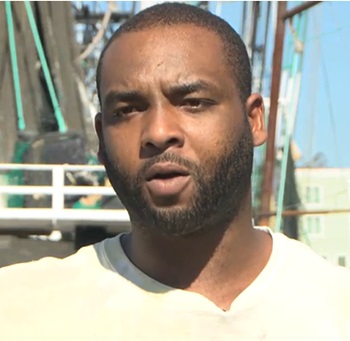 Communities across the southeast are closely watching Hurricane Milton as it crosses the gulf, especially local counties close to the Florida border. While shrimpers in Darien brace for Hurricane Milton, they’re still recovering from the effects of Helene. Shrimping is a major industry for the area, shrimpers say any storm causes concerns for them. “It has all the shrimp boat owners and captains pretty nervous about everything,” said local shrimper Jamey Bennett. While recovering, these shrimpers say they’re preparing for what’s next. “Believe it or not, most of the boats at this dock didn’t even take the lines off from the other hurricane because we seen the other one was brewing,” said shrimper Dwight “Wynn” Darwin Gale. Video, more, >>CLICK TO READ<< 13:35
Communities across the southeast are closely watching Hurricane Milton as it crosses the gulf, especially local counties close to the Florida border. While shrimpers in Darien brace for Hurricane Milton, they’re still recovering from the effects of Helene. Shrimping is a major industry for the area, shrimpers say any storm causes concerns for them. “It has all the shrimp boat owners and captains pretty nervous about everything,” said local shrimper Jamey Bennett. While recovering, these shrimpers say they’re preparing for what’s next. “Believe it or not, most of the boats at this dock didn’t even take the lines off from the other hurricane because we seen the other one was brewing,” said shrimper Dwight “Wynn” Darwin Gale. Video, more, >>CLICK TO READ<< 13:35
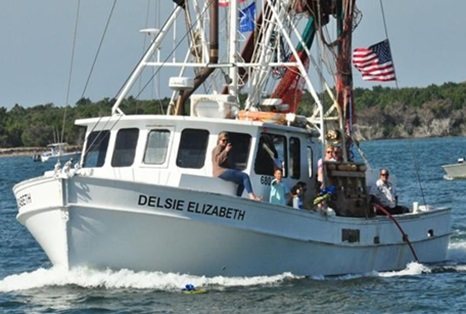
Blessing of the Fleet pays tribute to commercial fishing families
It was a picture-perfect day Sunday as the sun glistened on the rippling waters of Beaufort Inlet for the 27th annual Blessing of the Fleet ceremony, held at Radio Island between Morehead City and Beaufort. Twenty-five commercial fishing vessels slowly made their way by Radio Island as wreaths were thrown into the water. Each wreath represented a commercial fisherman or family member who had died. The solemn procession was a segment of the NC Seafood Festival that honors area commercial fishing families and those who have died while harvesting food from the sea. As well as about 200 people lining the shore to watch the procession, private boaters filled the waterway to pay tribute. 15 Photos, more, >>CLICK TO READ<< 14:46
More than $30 million & 300 jobs lost during 2019 spillway opening, MSU study finds
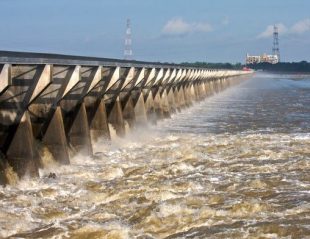 The 2019 opening of the Bonnet Carré Spillway cost the Mississippi Coast hundreds of jobs and millions of dollars, a scenario likely to repeat itself and endanger a seafood industry that has been vital to the economy and culture, a study from Mississippi State University concludes. The seafood industry also has declined because of competition from imports, the study noted. Interviews showed many fishermen, including those who specialize in shrimp and oysters, are selling their boats and leaving an industry that supported their families for generations. Video, more, >>CLICK TO READ<< 15:14
The 2019 opening of the Bonnet Carré Spillway cost the Mississippi Coast hundreds of jobs and millions of dollars, a scenario likely to repeat itself and endanger a seafood industry that has been vital to the economy and culture, a study from Mississippi State University concludes. The seafood industry also has declined because of competition from imports, the study noted. Interviews showed many fishermen, including those who specialize in shrimp and oysters, are selling their boats and leaving an industry that supported their families for generations. Video, more, >>CLICK TO READ<< 15:14
Navigating Alaska’s stormy seas
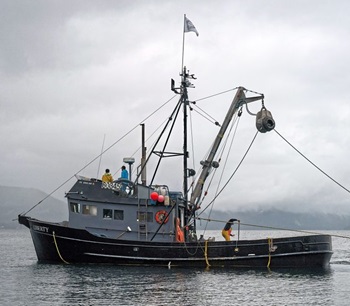 Norwegian fishermen settled in Petersburg in the 1800s, drawn to its ideal location for pursuing salmon, crab and halibut. Today, hundreds of vessels dock there, selling their catch to the town’s two major processors. These processors head and gut the fish before canning or freezing them for the journey to dinner tables across the world. One of these plants, built over a century ago, is the town’s largest private employer. Few know the industry better than Glorianne Wollen, a fisherman’s daughter who operates a large crab boat and serves as harbourmaster. From her small office, she has witnessed significant change over the years. “In the good old days, the town was alive with discussion,” Wollen recalls. “Everybody had a stake, everybody knew what was going on, and things happened in real-time.” That energy faded as boats grew larger and more efficient, requiring fewer crew members and leading to a more detached industry. Last year, however, the industry faced a crisis that even seasoned veterans struggled to recall. Photos, more, >>CLICK TO READ<< 16;20
Norwegian fishermen settled in Petersburg in the 1800s, drawn to its ideal location for pursuing salmon, crab and halibut. Today, hundreds of vessels dock there, selling their catch to the town’s two major processors. These processors head and gut the fish before canning or freezing them for the journey to dinner tables across the world. One of these plants, built over a century ago, is the town’s largest private employer. Few know the industry better than Glorianne Wollen, a fisherman’s daughter who operates a large crab boat and serves as harbourmaster. From her small office, she has witnessed significant change over the years. “In the good old days, the town was alive with discussion,” Wollen recalls. “Everybody had a stake, everybody knew what was going on, and things happened in real-time.” That energy faded as boats grew larger and more efficient, requiring fewer crew members and leading to a more detached industry. Last year, however, the industry faced a crisis that even seasoned veterans struggled to recall. Photos, more, >>CLICK TO READ<< 16;20
1 In 30 Million: Rare Yellow Lobster Caught Off Nantucket
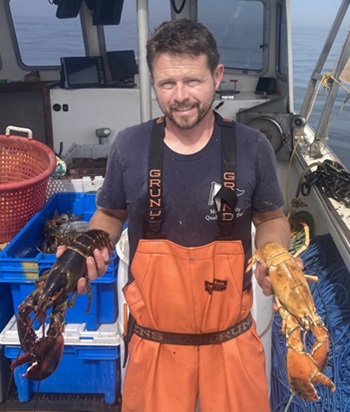 Jim Sjolund, captain of the Nantucket lobster boat Julie Alice, was hauling traps about 25 miles east of the island on Friday when his sternman Adam Spencer noticed something peculiar come out of the water. “At first, I didn’t think anything of it,” Sjolund said of the strange color inside one of the traps, believing it might be a fish. “But my sternman got excited, and I came over and said ‘holy sh**’!” Inside the trap was an incredibly rare yellow lobster. Sjolund knew right away it was unusual. But it wasn’t until he got back to Nantucket and did some research that Sjolund realized he had essentially hit the lobster lottery. The chances of catching a yellow lobster are 1 in 30 million, according to the University of Maine’s Lobster Institute. Photos, more, >>CLICK TO READ<<06:44
Jim Sjolund, captain of the Nantucket lobster boat Julie Alice, was hauling traps about 25 miles east of the island on Friday when his sternman Adam Spencer noticed something peculiar come out of the water. “At first, I didn’t think anything of it,” Sjolund said of the strange color inside one of the traps, believing it might be a fish. “But my sternman got excited, and I came over and said ‘holy sh**’!” Inside the trap was an incredibly rare yellow lobster. Sjolund knew right away it was unusual. But it wasn’t until he got back to Nantucket and did some research that Sjolund realized he had essentially hit the lobster lottery. The chances of catching a yellow lobster are 1 in 30 million, according to the University of Maine’s Lobster Institute. Photos, more, >>CLICK TO READ<<06:44
Lawsuit claims Oregon-based Pacific Seafood fired employee for reporting scheme to cheat shrimp boats out of millions
 A former Pacific Seafood employee has filed a $2.25 million lawsuit against his former employer, one of the nation’s biggest seafood companies, claiming it fired him after he discovered one of the brands had been falsifying the weights of catches it bought from shrimp boats and wrongly pocketed an extra $10 million to $20 million. The Portland-area company disputes the allegations in Justin Ottman’s lawsuit, filed last week in Multnomah County Circuit Court. Ottman’s suit, however, describes him as a whistleblower — claiming he’d documented the alleged years-long fraud in a 170-page report he presented to top executives. But his suit says when he continued to push the company to make it right, the company demoted him from his position as interim chief financial officer, forced him to work remotely and gave his desk to an intern before ultimately firing him by telling him his position had been “eliminated” in December 2023. more, >>CLICK TO READ<< 10:23
A former Pacific Seafood employee has filed a $2.25 million lawsuit against his former employer, one of the nation’s biggest seafood companies, claiming it fired him after he discovered one of the brands had been falsifying the weights of catches it bought from shrimp boats and wrongly pocketed an extra $10 million to $20 million. The Portland-area company disputes the allegations in Justin Ottman’s lawsuit, filed last week in Multnomah County Circuit Court. Ottman’s suit, however, describes him as a whistleblower — claiming he’d documented the alleged years-long fraud in a 170-page report he presented to top executives. But his suit says when he continued to push the company to make it right, the company demoted him from his position as interim chief financial officer, forced him to work remotely and gave his desk to an intern before ultimately firing him by telling him his position had been “eliminated” in December 2023. more, >>CLICK TO READ<< 10:23
Days on the water, nights at Town Office: Harpswell lobsterman advocates for working waterfront on 7 committees
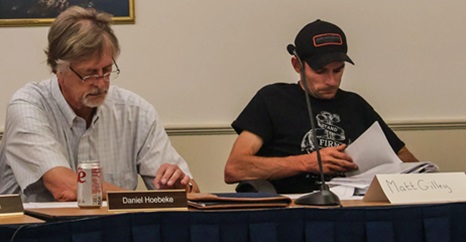 Matt Gilley stood in front of a shelf in his Cundy’s Harbor home. It holds a collection of marine oddities from the bottom of lobster traps, such as unique lobster claws, a seahorse, and a full-sized clam that grew inside a Coke bottle. “The fun part of it is, you don’t know what’s going to come up,” he said. Gilley himself is a rarity in Harpswell. In a town with 216 miles of coastline and “working waterfront” on many local signs, he is one of a small group of commercial lobstermen involved in town government, spending his mornings on the water and his evenings advocating for those who work on it. “I want to see lobstering continue, and the only way for that to continue is for there to be another generation,” he said. “If I can do anything to conserve what little we have left so other people can do it, I’m going to do it.” Photos, more, >>CLICK TO READ<< 09:10
Matt Gilley stood in front of a shelf in his Cundy’s Harbor home. It holds a collection of marine oddities from the bottom of lobster traps, such as unique lobster claws, a seahorse, and a full-sized clam that grew inside a Coke bottle. “The fun part of it is, you don’t know what’s going to come up,” he said. Gilley himself is a rarity in Harpswell. In a town with 216 miles of coastline and “working waterfront” on many local signs, he is one of a small group of commercial lobstermen involved in town government, spending his mornings on the water and his evenings advocating for those who work on it. “I want to see lobstering continue, and the only way for that to continue is for there to be another generation,” he said. “If I can do anything to conserve what little we have left so other people can do it, I’m going to do it.” Photos, more, >>CLICK TO READ<< 09:10
Harsh verdict on post-Brexit ‘sea of opportunity’
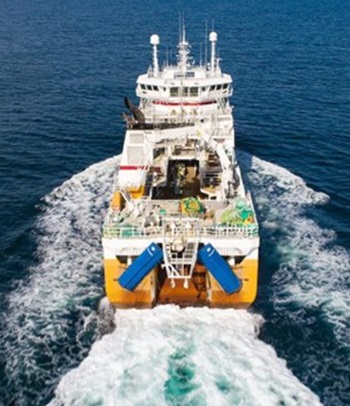 UK Fisheries operates the Hull freezer trawler Kirkella, having taken trawlers Norma Mary and Farnella out of service due to the lack of fishing opportunities, laying off the majority of their crews. ‘Not only has this had a devastating impact on them and their families, it has also dealt a severe blow to the social and economic fabric of the Humberside region,’ a UK Fisheries representative commented, referring to what the company refers to as ‘the abject failure of the fisheries policy of the previous administration.’ more, >>CLICK TO READ<< 08:09
UK Fisheries operates the Hull freezer trawler Kirkella, having taken trawlers Norma Mary and Farnella out of service due to the lack of fishing opportunities, laying off the majority of their crews. ‘Not only has this had a devastating impact on them and their families, it has also dealt a severe blow to the social and economic fabric of the Humberside region,’ a UK Fisheries representative commented, referring to what the company refers to as ‘the abject failure of the fisheries policy of the previous administration.’ more, >>CLICK TO READ<< 08:09
Editorial: Save commercial fishing industry
 Commercial fishing operators working out of the harbor in West Ocean City have been cast adrift, as the push to build an offshore wind farm about 12 miles east of Ocean City has rolled over their concerns. As was noted in a meeting Tuesday between Department of Natural Resources officials and commercial fishing operators, the construction of a maintenance facility at the commercial harbor could leave the few boats still operating there without space to unload their catch. No one, outside of the fishing community itself, apparently thought of that problem and one suspects that the state and federal governments would advise members of that industry to produce their own solution, which they don’t have the resources to do. more, >>CLICK TO READ<< 06:35
Commercial fishing operators working out of the harbor in West Ocean City have been cast adrift, as the push to build an offshore wind farm about 12 miles east of Ocean City has rolled over their concerns. As was noted in a meeting Tuesday between Department of Natural Resources officials and commercial fishing operators, the construction of a maintenance facility at the commercial harbor could leave the few boats still operating there without space to unload their catch. No one, outside of the fishing community itself, apparently thought of that problem and one suspects that the state and federal governments would advise members of that industry to produce their own solution, which they don’t have the resources to do. more, >>CLICK TO READ<< 06:35
US fishery management council’s structure is unconstitutional, court rules
Dungeness are WA’s most lucrative seafood, but we know little about them
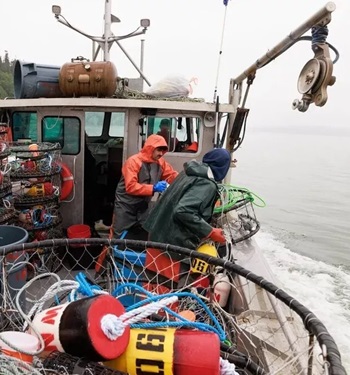 Dom Wilbur slammed the knife into the frozen squid, sending shattered ice flying. Nearby stacks of crab pots teetered as his dad throttled the boat past the Skagit River delta and carved deeper into the fog. As the salty mist enveloped the deck, Dom Wilbur and his cousin Alex Stewart heaved empty pots and stuffed bait traps with the squid and chum salmon. “Go ahead, boys,” J.J. Wilbur called out from the rear cab window. Dom Wilbur and Stewart tossed the buoy off the side of the boat, followed by the splash of a 65-pound pot. They would repeat this dance dozens of times on a late June afternoon and haul up a bounty of Dungeness before sunset. more, >>CLICK TO READ<< 09:23
Dom Wilbur slammed the knife into the frozen squid, sending shattered ice flying. Nearby stacks of crab pots teetered as his dad throttled the boat past the Skagit River delta and carved deeper into the fog. As the salty mist enveloped the deck, Dom Wilbur and his cousin Alex Stewart heaved empty pots and stuffed bait traps with the squid and chum salmon. “Go ahead, boys,” J.J. Wilbur called out from the rear cab window. Dom Wilbur and Stewart tossed the buoy off the side of the boat, followed by the splash of a 65-pound pot. They would repeat this dance dozens of times on a late June afternoon and haul up a bounty of Dungeness before sunset. more, >>CLICK TO READ<< 09:23
San Marco VII – New crabber/trawler to operate in Canada’s Gulf of Saint Lawrence
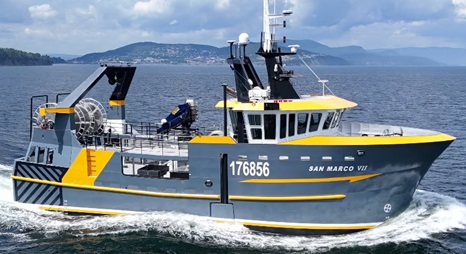 Pêcheries Michel Turbide, a fishing company owned by boat skipper Marco Turbide of Quebec, has taken delivery of a new combination trawling and crab fishing vessel built by Canadian shipyard Chantier Naval Forillon. The Navanex-designed San Marco VII will be operated primarily in the Gulf of Saint Lawrence, where it will fish for redfish and snow crab depending on the season. The newbuild has a steel hull and an aluminium superstructure. Power is provided by a Yanmar main engine driving a Kaplan four-blade propeller to deliver speeds of up to 10 knots. The engine produces a high enough torque for trawling operations. Specifications, photos, more, >>CLICK TO READ<< 06:56
Pêcheries Michel Turbide, a fishing company owned by boat skipper Marco Turbide of Quebec, has taken delivery of a new combination trawling and crab fishing vessel built by Canadian shipyard Chantier Naval Forillon. The Navanex-designed San Marco VII will be operated primarily in the Gulf of Saint Lawrence, where it will fish for redfish and snow crab depending on the season. The newbuild has a steel hull and an aluminium superstructure. Power is provided by a Yanmar main engine driving a Kaplan four-blade propeller to deliver speeds of up to 10 knots. The engine produces a high enough torque for trawling operations. Specifications, photos, more, >>CLICK TO READ<< 06:56
Fishing group, N.S. fisherman happy with Canada-France halibut deal
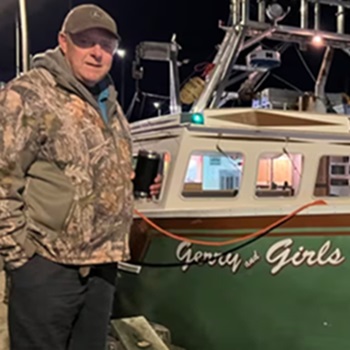 Canada and France have reached a deal to try to end a long-simmering dispute over halibut fishing on Canada’s Atlantic coast. In exchange for a three per cent share of the Canadian quota, French fishing vessels will fish outside Canadian waters and agree to have their catch monitored. According to Shelburne fisherman Gary Dedrick, French fishermen have been harvesting in Canadian waters outside the designated French fishing zone surrounding St-Pierre-Miquelon, France’s eight small islands off Newfoundland’s southern coast, and not limiting their catches. “They will be allowed to fish Atlantic halibut in their own territory and also outside 200 miles, but they won’t be able to fish in Canadian waters,” said Lapointe, who is looking to federal authorities to increase monitoring and catch reporting now that there’s a formal agreement. more, >>CLICK TO READ<< 14: 19
Canada and France have reached a deal to try to end a long-simmering dispute over halibut fishing on Canada’s Atlantic coast. In exchange for a three per cent share of the Canadian quota, French fishing vessels will fish outside Canadian waters and agree to have their catch monitored. According to Shelburne fisherman Gary Dedrick, French fishermen have been harvesting in Canadian waters outside the designated French fishing zone surrounding St-Pierre-Miquelon, France’s eight small islands off Newfoundland’s southern coast, and not limiting their catches. “They will be allowed to fish Atlantic halibut in their own territory and also outside 200 miles, but they won’t be able to fish in Canadian waters,” said Lapointe, who is looking to federal authorities to increase monitoring and catch reporting now that there’s a formal agreement. more, >>CLICK TO READ<< 14: 19
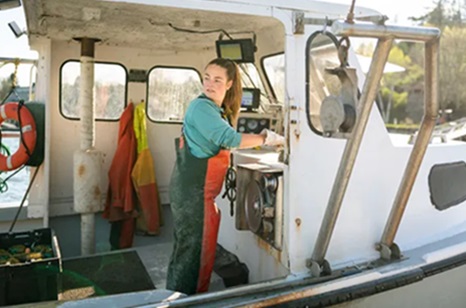
Maine lobster fisherman reveals why the crustaceans she catches taste ‘sweeter, ‘better’
The daughter of a lobster fisherman from Maine describes herself as being “born into it.” Sadie Samuels left the Pine Tree State and headed to college across the country in California, but she kept fishing during the summers to pay for her tuition. After graduation in 2013, she began fishing full-time and has never looked back. Samuels, 32, opened her restaurant, Must Be Nice Lobster – which has the same name as her boat, F/V Must Be Nice – in a permanent indoor location in 2022. “My dad kind of kicked me off his boat because you can only fish 800 traps on a boat,” she said. “So, the more I wanted to fish, the less he could fish if I still fished on his boat.” “[My father] finally was like, ‘All right, obviously you’re interested in this. Go buy a boat,'” she recalled. “So that’s pretty much how that happened.” Photos, Video, more, >>CLICK TO READ<< 12:17
Urgent MAIB warning following MOB fatality
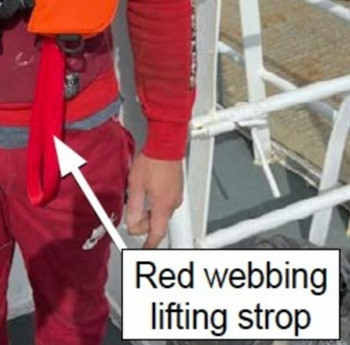 The Marine Accident Investigation Branch (MAIB) has issued a safety bulletin following the fatal accident onboard the 18.35m crabber Kingfisher DH 110 (FN, 25 July, ‘Fatal MOB from Dartmouth crabber’). The bulletin urges the Home and Dry Safety Forum to immediately communicate through its members the need for owners and crew of potting vessels to review their deck working risk assessments. The Kingfisher tragedy, which occurred 30nm east-north-east of Wick on 12 July this year, saw a deckhand become attached to the backrope and be pulled overboard while manually toggling on creels. The deckhand’s PFD automatically inflated, and he initially surfaced, leading the crew to believe he was clear of the backrope and floating freely. more, >>CLICK TO READ<< 10:06
The Marine Accident Investigation Branch (MAIB) has issued a safety bulletin following the fatal accident onboard the 18.35m crabber Kingfisher DH 110 (FN, 25 July, ‘Fatal MOB from Dartmouth crabber’). The bulletin urges the Home and Dry Safety Forum to immediately communicate through its members the need for owners and crew of potting vessels to review their deck working risk assessments. The Kingfisher tragedy, which occurred 30nm east-north-east of Wick on 12 July this year, saw a deckhand become attached to the backrope and be pulled overboard while manually toggling on creels. The deckhand’s PFD automatically inflated, and he initially surfaced, leading the crew to believe he was clear of the backrope and floating freely. more, >>CLICK TO READ<< 10:06
Ottawa shirked own guidelines when it reopened commercial cod fishery, say scientists
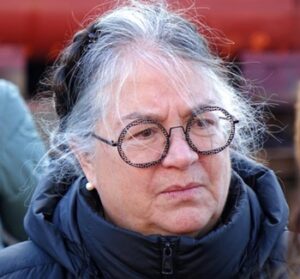 Fisheries scientists say the federal government ignored its own guidelines when it hiked cod quotas off the northern and eastern coasts of Newfoundland and Labrador last June. The scientists, some of whom worked for Fisheries and Oceans Canada for decades, say they’re struggling to understand the decision to reopen the commercial Northern cod fishery. “I was baffled when I heard the news”, said Noel Cadigan, a long-time DFO scientist who now works at Memorial University’s Marine Institute. “And that hasn’t changed.” A May 6 briefing note obtained by CBC/Radio-Canada shows DFO recommended against reopening the fishery to offshore vessels and increasing quotas. But it also assured Federal Fisheries Minister Diane Lebouthillier that lifting the moratorium and hiking the total allowable catch, as all six Liberal MPs from Newfoundland and Labrador were pushing her to do, would nevertheless align with the Fisheries Act and its rules on stock management. more, >>CLICK TO READ<< 11:15
Fisheries scientists say the federal government ignored its own guidelines when it hiked cod quotas off the northern and eastern coasts of Newfoundland and Labrador last June. The scientists, some of whom worked for Fisheries and Oceans Canada for decades, say they’re struggling to understand the decision to reopen the commercial Northern cod fishery. “I was baffled when I heard the news”, said Noel Cadigan, a long-time DFO scientist who now works at Memorial University’s Marine Institute. “And that hasn’t changed.” A May 6 briefing note obtained by CBC/Radio-Canada shows DFO recommended against reopening the fishery to offshore vessels and increasing quotas. But it also assured Federal Fisheries Minister Diane Lebouthillier that lifting the moratorium and hiking the total allowable catch, as all six Liberal MPs from Newfoundland and Labrador were pushing her to do, would nevertheless align with the Fisheries Act and its rules on stock management. more, >>CLICK TO READ<< 11:15
Proposed wind farms ‘devastating’ for fishers
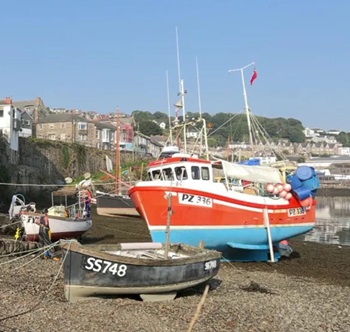 Proposals to expand planned wind farm sites off the Devon and Cornwall coast could devastate the fishing industry, fishermen have warned. It comes after the Crown Estate, which owns the sea bed, published its latest map of potential development zones. It includes thousands of square miles off Land’s End and the Isles of Scilly, currently prime fishing grounds, and an expanded zone off north Devon. Dave Stevens, who has fished off Newlyn for 30 years, said new offshore wind development would not be good for the industry. “It would be a devastating blow if that went ahead,” he said. “Everyone would be wanting to get out. “I don’t think the industry has been this challenged ever.” more, >>CLICK TO READ<< 08:35
Proposals to expand planned wind farm sites off the Devon and Cornwall coast could devastate the fishing industry, fishermen have warned. It comes after the Crown Estate, which owns the sea bed, published its latest map of potential development zones. It includes thousands of square miles off Land’s End and the Isles of Scilly, currently prime fishing grounds, and an expanded zone off north Devon. Dave Stevens, who has fished off Newlyn for 30 years, said new offshore wind development would not be good for the industry. “It would be a devastating blow if that went ahead,” he said. “Everyone would be wanting to get out. “I don’t think the industry has been this challenged ever.” more, >>CLICK TO READ<< 08:35
Humboldt Fisherman’s Wives Holding Burn Recovery Fundraiser for Captain and Two Crews Members of Mariah K
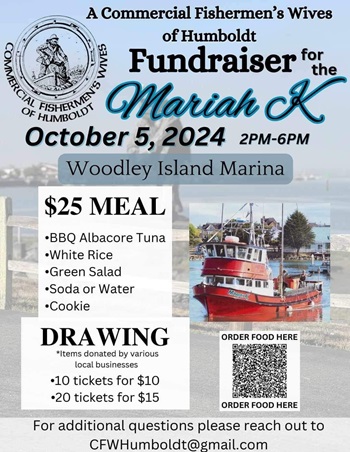 The Humboldt fisherman’s wives has generously offered to put on a Burn recovery fundraiser for my nephew and his 2 crew members that sustained severe burns while commercial fishing off of Oregon Coast a month ago when the boat engine exploded. The 2 crew were released from the hospital a couple weeks ago and are now recovering at home. My nephew Emanuel, the captain of the Mariah K is still in the intensive care unit at St Francis burn center in San Francisco. more, >>CLICK TO READ<< 07:02
The Humboldt fisherman’s wives has generously offered to put on a Burn recovery fundraiser for my nephew and his 2 crew members that sustained severe burns while commercial fishing off of Oregon Coast a month ago when the boat engine exploded. The 2 crew were released from the hospital a couple weeks ago and are now recovering at home. My nephew Emanuel, the captain of the Mariah K is still in the intensive care unit at St Francis burn center in San Francisco. more, >>CLICK TO READ<< 07:02
Filipino fisherman adrift at sea for 47 days, has been rescued
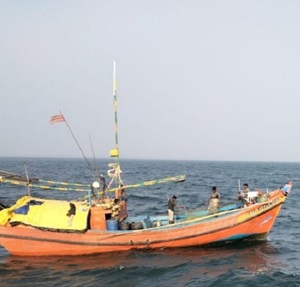 A 49-year-old Filipino fisherman who spent 47 days drifting aimlessly at sea has been rescued after surviving on rainwater, coconuts and fish, the Philippine Coast Guard said on Friday. Robin Dejillo, a native of Quezon province, southeast of Manila, has been reported missing since August 4 after his boat ran out of gas while conducting a fishing venture, Xinhua news agency reported. Dejillo survived for more than a month at sea by drinking rainwater and eating fish. He was also sustained by eating coconuts floating on water. more, >>CLICK TO READ<< 10:32
A 49-year-old Filipino fisherman who spent 47 days drifting aimlessly at sea has been rescued after surviving on rainwater, coconuts and fish, the Philippine Coast Guard said on Friday. Robin Dejillo, a native of Quezon province, southeast of Manila, has been reported missing since August 4 after his boat ran out of gas while conducting a fishing venture, Xinhua news agency reported. Dejillo survived for more than a month at sea by drinking rainwater and eating fish. He was also sustained by eating coconuts floating on water. more, >>CLICK TO READ<< 10:32
Tom Anglin of Guemes Island, WA, has passed away
 “Tell me a sea story” Tom Anglin would say. He passed peacefully at home on Guemes Island, WA on a beautiful afternoon, September 12, 2024. To say that Tom was a larger than life character is an understatement. He was born in Seattle, WA on July 3, 1943 to (Thomas) Dale and Ila Jean Anglin. Tom grew up in the small town of Coolin on Priest Lake, Idaho, where his love for fishing began. He graduated from Priest River High School in 1962, before joining the US Navy. Tom’s sea story began boarding the USS Burton Island Icebreaker in Seattle bound for Antarctica for Operation Deepfreeze to resupply McMurdo Station and then the Arctic becoming a shellback on the journey. Tom took his electronics training from the Navy to the North Slope of Alaska, forging life-long friendships as an electrician before buying his first boat, the Bubble Cuffer II. Each vessel was a new chapter in the greatest commercial fishing adventure: the little Katrina, Katrina, Baltic Sea and finally the Kona-Kai. Spanning ports from Sausalito to SE AK and Hawaii to SW Alaska, trolling for king salmon to pot fishing king crab in the Bering Sea. more, >>CLICK TO READ<< 19:42
“Tell me a sea story” Tom Anglin would say. He passed peacefully at home on Guemes Island, WA on a beautiful afternoon, September 12, 2024. To say that Tom was a larger than life character is an understatement. He was born in Seattle, WA on July 3, 1943 to (Thomas) Dale and Ila Jean Anglin. Tom grew up in the small town of Coolin on Priest Lake, Idaho, where his love for fishing began. He graduated from Priest River High School in 1962, before joining the US Navy. Tom’s sea story began boarding the USS Burton Island Icebreaker in Seattle bound for Antarctica for Operation Deepfreeze to resupply McMurdo Station and then the Arctic becoming a shellback on the journey. Tom took his electronics training from the Navy to the North Slope of Alaska, forging life-long friendships as an electrician before buying his first boat, the Bubble Cuffer II. Each vessel was a new chapter in the greatest commercial fishing adventure: the little Katrina, Katrina, Baltic Sea and finally the Kona-Kai. Spanning ports from Sausalito to SE AK and Hawaii to SW Alaska, trolling for king salmon to pot fishing king crab in the Bering Sea. more, >>CLICK TO READ<< 19:42
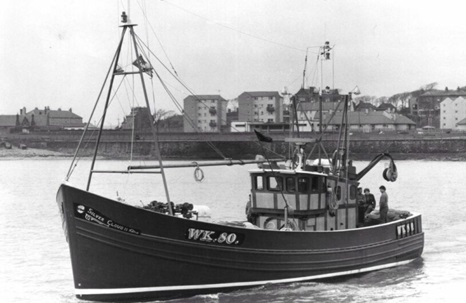
50 years and counting: Silver Cloud II WK 80
George Carter was born and bred in the Caithness village of Lybster, by the harbour, and he fished straight out of school, getting his skipper’s ticket in 1956 at the age of 21. His father Hugh was a fish curer with small creel boat, and his grandfather had always been keen to say that he’d never earned a penny on dry land! The Carter family have gone down in history with two record catches with the seine-net. In 1964, George’s brother Jack landed a record of 240 boxes of cod in a single drag in the Freswick grounds in the north of the Moray Firth aboard the Maid of Honour WK 30, which was built in 1950 by David Howarth of Scalloway (of Shetland Bus fame). Then George, aboard the Silver Cloud, landed 378 boxes with two drags in 1966. The 47ft Silver Cloud WK 207 was George’s first boat, which he purchased in 1962. That vessel was built at Bolson’s yard in Poole as an Admiralty MFV, and by 1951 was owned by John Watt of Fraserburgh, re-registered as FR 313. In 1952 she was sold to Tom Scott Goodlad of Scalloway and re-registered as LK 217. Tom tragically died onboard in May 1958. His brother John then took the boat. more, >>CLICK TO READ<< 07:38
Against the Wind: Questions About BOEM’s Fisheries Analysis
 The Bureau of Ocean Energy Management (BOEM) announced the final sale notice for the Gulf of Maine offshore wind project lease areas on Sept. 16. The agency shrunk the overall area by 120,000 acres, removing significant portions of the two northern leases off the coast of Maine, carving a transit lane between the two farthest-offshore southern areas, and shaving small portions off other southern areas. This decision did little to satisfy Jerry Leeman, a Harpswell, Maine-based former commercial fisherman and founder of the New England Fishermen’s Stewardship Association (NEFSA), an organization that opposes the Gulf of Maine offshore wind area. NEFSA “remains steadfast in its opposition,” wrote Leeman in a press release, “despite the shrinking of the original areas.” more, >>CLICK TO READ<< 06:22
The Bureau of Ocean Energy Management (BOEM) announced the final sale notice for the Gulf of Maine offshore wind project lease areas on Sept. 16. The agency shrunk the overall area by 120,000 acres, removing significant portions of the two northern leases off the coast of Maine, carving a transit lane between the two farthest-offshore southern areas, and shaving small portions off other southern areas. This decision did little to satisfy Jerry Leeman, a Harpswell, Maine-based former commercial fisherman and founder of the New England Fishermen’s Stewardship Association (NEFSA), an organization that opposes the Gulf of Maine offshore wind area. NEFSA “remains steadfast in its opposition,” wrote Leeman in a press release, “despite the shrinking of the original areas.” more, >>CLICK TO READ<< 06:22
Save Our Shrimpers: Texas Fishermen In Danger
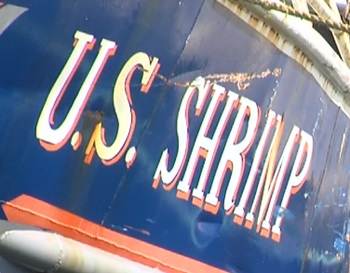 Congressman Troy Nehls believes American money is being used to endanger America’s shrimping industry and he wants to put a stop to it through the Save Our Shrimpers (SOS) Act. “Our American companies are trying to compete with this shrimp coming in from Ecuador, and it’s just killing the prices,” Nehls (R-TX) noted. He said he heard from fishermen across his district and the entire Gulf region who told him they are no longer sending out shrimping trawlers because foreign competition has driven prices too low and inflation has driven expenses so high that it is no longer profitable. “Our American shrimpers are being squeezed to the point that they’re going to lose their businesses. And many of these businesses are second, third, fourth generation,” he added. more, >>CLICK TO READ<< 09:50
Congressman Troy Nehls believes American money is being used to endanger America’s shrimping industry and he wants to put a stop to it through the Save Our Shrimpers (SOS) Act. “Our American companies are trying to compete with this shrimp coming in from Ecuador, and it’s just killing the prices,” Nehls (R-TX) noted. He said he heard from fishermen across his district and the entire Gulf region who told him they are no longer sending out shrimping trawlers because foreign competition has driven prices too low and inflation has driven expenses so high that it is no longer profitable. “Our American shrimpers are being squeezed to the point that they’re going to lose their businesses. And many of these businesses are second, third, fourth generation,” he added. more, >>CLICK TO READ<< 09:50







